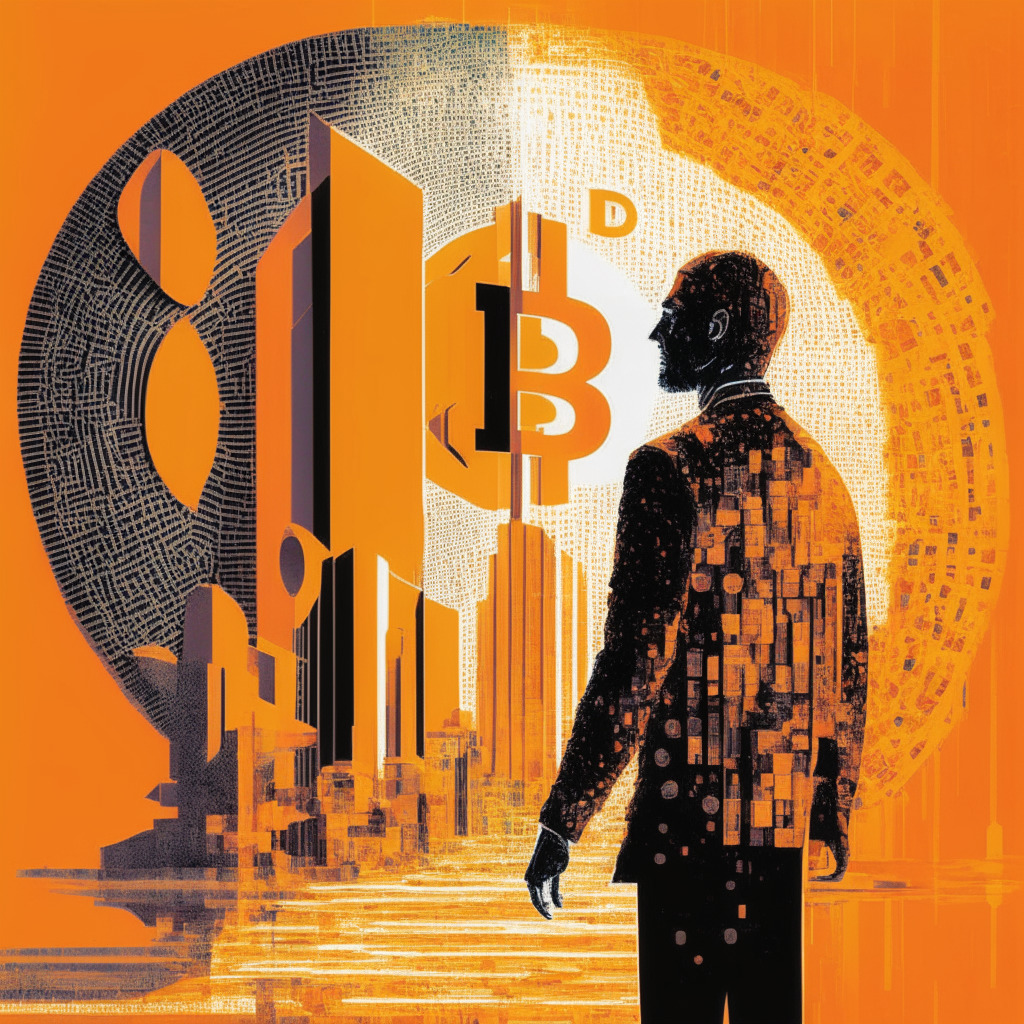“Amidst mainstream cryptocurrency market challenges, investors with high-risk tolerance explore fringe cryptos which can yield astronomical intra-day gains. However, these assets carry certain risks like buy and sell taxes, large volume transaction prevention, and trading cool-down mechanisms. Inherent crypto investment risks underscore the need for due diligence before participation.”
Search Results for: 2017
Blockchain Under the Dragon: Crypto Future in a Tightening Chinese Regulatory Landscape
“A Chinese government official has received a life sentence due to his involvement in illicit activities, including a Bitcoin mining business. Xiao Yi was found guilty of corruption and the abuse of power. His charges tie back to his relations with Jiumu Group Genesis Technology. The company operated a significant number of Bitcoin mining machines and consumed around 10% of Fuzhou city’s electricity. Yi’s sentence highlights China’s strict stance on illegal cryptocurrency operations.”
Merging Finance and Blockchain: eToro’s Radical Shift versus Elon Musk’s Risky Maneuvers
“Yoni Assia, eToro’s co-founder, embraced financial technologies to democratize trading. eToro, under his steer, simplified brokerage account set up, enabling users to start trading swiftly. Influenced by programmer Vitalik Buterin, eToro introduced Bitcoin trading, aiding in a blockchain industry transformation.”
US Lawmakers, SPBD Licenses, and Crypto: Unraveling a Tangled Web of Regulation and Politics
US lawmakers have raised concerns over the issuance of a Special Purpose Broker-Dealer license to Prometheum amid questions about its operations and alleged ties to the Chinese Communist Party. Meanwhile, Coinbase is advocating for pro-crypto political figures, despite controversies which cast a shadow over its initiative. The future of crypto regulation remains unpredictable.
Tokenizing Ghana’s Commodities: A Blockchain-Backed Path to Prosperity or a Fear-Induced Stalemate?
“Tokenization of commodities like gold, cocoa, and oil through blockchain could transform economies of African nations such as Ghana. This process would reduce transaction fees, amplify revenue, and open new trading avenues. However, hesitation in adopting and integrating crypto technologies in regulatory frameworks remains a significant obstacle.”
Striking a Balance: UK’s Rigorous Crypto Regulation Process and its Potential Backlash
The Financial Conduct Authority’s (FCA) rigorous registration process has led to only 13% of crypto companies receiving approval, as the requirements are deemed too challenging by some firms. The FCA’s stern warning that any information deficiency will lead to application rejection, along with a proposed ban on crypto incentives, further complicates the crypto industry’s operation in the UK.
Shifting Political Winds: Potential Impact on US Crypto Regulatory Landscape Post 2024 Election
Recent comments from former SEC official John Reed Stark suggest potential changes to U.S. crypto regulation influenced by party politics. Stark attributes a pro-crypto regulation shift to a possible Republican win in 2024, ending current SEC chair Gensler’s tenure, and potentially paving the way for Hester Peirce, known for her softer stance on crypto.
Navigating Global Regulatory Frameworks for Cryptocurrencies: A detailed Analysis & Perspective
“Regulatory frameworks are playing a crucial role in the crypto market, influencing price fluctuations. As nations worldwide compete to create clear crypto regulations, crypto regulatory clarity is transitioning from a luxury to a critical necessity for future growth.”
Decoding the Bart Simpson Pattern: A Breakdown of Bitcoin’s Cyclical Market Trends
“Bitcoin’s price has been range-bound, signifying a ‘Bart Simpson pattern’ indicating a cyclical bearish-bullish trend. While the ‘buy and hodl’ strategy is often advised, market forces and historical patterns play significant roles in Bitcoin’s price movements, and its future trajectory remains uncertain.”
Decentralized Finance’s Future: Evaluating the Potential and Challenges of Velvet Capital
“Emerging from obscurity, DeFi is gaining influence in finance as enterprises and individuals pivot from centralized bodies to decentralized alternatives. Velvet Capital, backed by Binance Labs, offers on-chain digital asset management. Yet, concerns linger about security risks and skepticism towards its approach remains.”
In Search of Originality: The Unconventional Approach of Lea Thompson in Crypto Communication
Lea Thompson, known as Girl Gone Crypto, disapproves the repetitive “breaking” news tweets on crypto, opting for engaging commentary and humor. Her unique approach, offering her followers refreshingly unconventional content, has largely contributed to her growing popularity within the crypto community.
Massachusetts’ Scrutiny on AI in Securities: Protecting Investors or Stifling Innovation?
Massachusetts authorities have initiated a probe into business interactions with AI, its impact on investors, and its potential misuse in the securities industry. The investigation seeks to ensure AI systems do not subtly prioritize firm interests over clients, reinforcing the need for careful regulation.
Crypto Conundrum: China’s Unofficial Crypto Boom Despite Ban and Its Impact on Binance
Despite China’s ban on cryptocurrencies in September 2021, Chinese traders reportedly facilitated $90 billion worth of crypto trades on Binance in one month this year, accounting for one-fifth of Binance’s global volume. These trades are enabled through virtual private networks, allowing users to bypass censorship. However, this situation could escalate Binance’s regulatory challenges in the U.S. despite its growing popularity in the Chinese market.
Navigating the New Norm: Namibia’s Crypto Regulatory Stringency versus Flexibility
“Cryptocurrency firms in Namibia will operate under the newly sanctioned Virtual Assets Act, marking a regulatory shift from 2017 when crypto exchanges were considered illegal. Notably, the new regulation, referred to as a ‘skeleton’ for its initial form, raises both excitement and skepticism about the future of blockchain companies in the country.”
Evaluating Cryptocurrency Growth: Past Performance & Future Prospects in a Volatile Landscape
The cryptocurrency circle has seen significant changes since 2017, with Bitcoin hitting a remarkable peak. Top cryptocurrencies have shown remarkable resiliency and growth, sparking interest from investors. However, volatility and legal issues also punctuate the market, prompting the need for investor caution.
Navigating Borderless Blockchain: The Dual Life of A Bankrupt Crypto-Titan
Kyle Davies, co-founder of the bankrupt cryptocurrency hedge fund Three Arrows Capital, asserts immunity from U.S courts due to his Singaporean citizenship. Amidst court proceedings, Davies and co-founder Su Zhu allegedly pursued leverage despite insolvency, creating a $3.5 billion deficit. Meanwhile, they enjoyed luxuries in Bali, even starting a new project—a crypto exchange for trading bankruptcy claims.
Exploring Litecoin’s Halving Impact: Past, Present, and Future Speculation
The Litecoin Network is preparing for its third mining-reward cut, a process that halves the per-block reward miners receive. However, past halvings didn’t lead to a surge in LTC prices as expected. Reactions to these events suggest that traders anticipate halvings, resulting in pre-event rallies followed by sell-offs.
BlackRock CEO’s Bitcoin Conversion: A Turning Point or Mere Market Strategy?
Outspoken CEO of BlackRock, Larry Fink, a former Bitcoin critic, has now endorsed the cryptocurrency, triggering positive reactions. His change of stance first became noticeable when BlackRock submitted an application for a Bitcoin spot ETF. Fink’s newfound Bitcoin approval and BlackRock’s ETF aspirations could trigger an “adoption cycle” and potentially help Bitcoin exceed its record high.
Unmasking Blockchain’s Role in East African Agriculture: Promising Rise or Insurmountable Challenge?
“East African farmers are exploring blockchain technologies to gain international clients. Meanwhile, blockchain’s immutable nature, vital for proving adherence to ethical practices to international clients, has led AgTech firm Dimitra and One Million Avocados to improve Kenyan farming practices. However, skeptics cite challenges with technology absorption and shifting traditional farming practices.”
Navigating the Crypto Market: Bulls, Bears, and the Risky Business of ‘Pigs’
“Bulls, bears, and ‘pigs’ shape the crypto market dynamics with their varying tendencies. Successful blockchain investment lies in a balanced approach – blending long-term investments and short-term trades. Crucial to navigate this volatile market is effective risk management, continuous learning, and adaptation, avoiding the pitfalls of excessive risk-taking.”
Institutional Embrace of Altcoins Amid Regulatory Uncertainties: A Deep Dive
Institutional investors have surged their investments in altcoin-based products such as XRP, Stellar’s XLM, and Solana’s SOL, despite a tentative market sentiment. Products based on these coins saw significant growth in assets under management, with Stellar’s XLM witnessing a remarkable 62.7% increase.
The Reality Check: Quantstamp Penalization and the Regulation Challenge in Blockchain
Quantstamp, a blockchain security firm, faced a $28 million SEC penalty for conducting an unregistered ICO for QSP tokens in 2017. Incurring additional fines for trading these tokens on third-party platforms, Quantstamp had to establish a “Fair Fund” to reimburse investors, potentially leading to permanent disablement or destruction of QSP tokens. This incident underscores the tension between deregulation and regulatory compliance in blockchain technology.
Emerging Crypto Capital: France’s Rise in the Global Blockchain Landscape
“France emerges as a key player in the global crypto stage, thanks to supportive regulators, robust Web3 development, and a thriving talent community. The country’s inclusive attitude towards crypto, flexible regulatory framework, and significant investments in technology sectors positions it at the forefront of the European crypto ecosystem.”
Jimmy Butler’s Crypto Lawsuit & Namibia’s Pivot to Regulation: The Ongoing Crypto Dilemma
Jimmy Butler, Miami Heat basketball player, seeks dismissal from a lawsuit alleging he promoted unregistered securities via Binance. He argues his tweets were warnings against celebrity crypto endorsements. Meanwhile, Namibia has begun regulating virtual asset service providers, although cryptocurrencies aren’t accepted as legal tender. The tug of war between promotion and restriction characterizes cryptocurrency’s disruptive potential.
Namibia Embraces Crypto Regulations: A Breakthrough or a Setback?
“Namibia has signed a law regulating Virtual Asset Service Providers, reversing its 2017 ban on crypto exchanges. The law aims to enhance consumer protection, curb market abuse, and mitigate money laundering and terrorism financing risks. However, severe penalties apply for non-compliance and cryptocurrencies still hold no legal tender status in Namibia, potentially creating a hostile environment for crypto businesses.”
Navigating the Cryptocurrency Downturn: Analyzing Underdogs Amidst Bitcoin’s Deceleration
“The wider cryptocurrency market, including Bitcoin, is enduring a downswing due to volatile sellers. However, opportunity abounds in select cryptocurrencies like Chainlink, Chimpzee, Compound, DeeLance, and Stellar. Understanding these market changes is crucial for exploiting potential investment opportunities amidst market volatility.”
Binance Coin Burn: A Bold Move Amid Regulatory Challenges and Bearish Market Predictions
Binance, a leading crypto exchange, has completed its quarterly burn of 1.99 million BNB coins (around $477 million), as part of a commitment to reduce the token’s supply. Despite regulatory challenges and market skepticism, Binance persists in its Auto-Burn and Pioneer Burn initiatives to maintain its supply path.
Kuwait’s Crackdown on Cryptocurrency: A Protective Shield or a Regulatory Overreach?
The Central Bank of Kuwait and other regulatory bodies have collectively moved to ban most cryptocurrency activities within their region, aiming to protect investors from potential risks. However, some exceptions were made for financial instruments regulated by the Central Bank itself.
Crypto Pioneer Treads Volatile Waters: The Journey of KIN and the Birth of Code Wallet
The minimalist crypto wallet Code, backed by the former CEO of Kik, has launched its Solana-based application focusing on the KIN cryptocurrency. Despite regulatory challenges, Code’s founder believes it offers potential for adoption due to its clearance for U.S trading. Confidently advocating for ‘digital paper cash’, it also allows transactions during network outages. However, its success relies heavily on KIN’s acceptance as a legitimate payment method, a venture that comes with risks due to price volatility.
The Digital Ruble’s Accelerated Path: CBDC Advancements amidst International Intrigue
“Russia’s CBDC project, a centralized Digital Ruble, is projected for completion by 2025-2027. The Central Bank aims for the digital ruble to coexist with traditional cash, fostering a flexible transaction ecosystem. Despite potential losses, legislation outlines a framework for the digital ruble ecosystem that ensures high-level cybersecurity and reliability in a balanced, meticulously designed solution.”
The Strategy and Impact of Token Burns: BNB Chain’s 24th Burn Event.
“The Blockchain BNB Chain recently incinerated over 1.99 million BNB tokens, aligning with the ‘auto-burn’ protocol, and diminishing $484 million worth of tokens from circulation. Token burn aims to stimulate scarcity by permanently reducing the circulating supply. However, such events do not always stimulate immediate market demand, posing questions about the real-time effectiveness of these strategies.”
Tokenizing the Future: How Blockchain Could Revolutionize Real-World Assets
“Tokenization of real-world assets like stocks, bonds, cars and artwork, can boost liquidity and democratize access to capital markets. The potential market for tokenized assets may reach $16 trillion by 2030. These advancements could transform financial markets, making transactions more immediate and processes more fluid.”































